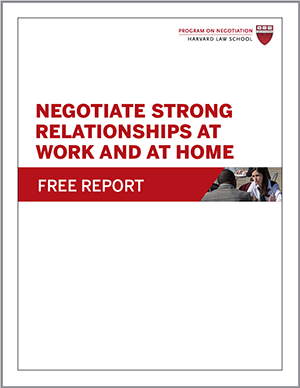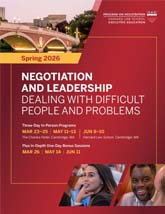
In a series on Water Diplomacy, Program on Negotiation faculty member Lawrence Susskind and his colleague Shafiqul Islam presented their research with regard to water diplomacy in the Middle East.
When countries face contending water claims, one of the biggest obstacles to reaching an agreement is uncertainty in the dispute resolution process. Specifically, there are three types of uncertainty.
Uncertainty of Information
- Parties are often unable to assign probabilities to the likelihood of particular events occurring. This type of uncertainty ranges from zero (in which they are completely confident about the forecasts), to intermediate levels (which involve events with known probability ranges), to high levels of uncertainty (in which they have almost no idea what the future holds). For example, in the arid Jordan River basin, it is difficult to predict next year’s rainfall by relying on historical records.
Uncertainty of Action
- Parties often cannot predict a cause-effect relationship, such as whether certain policies or programs will produce the results they desire. For example, authorities in Jordan and Israel planning to build dams have not been able to predict exactly how these would affect water quality.
Uncertainty of Perception
- This occurs when people “see” what they expect to see rather than what is actually there, which can happen when questions are framed in ideological or political terms.
All three types of uncertainty in dispute resolution shaped the water-management decisions facing Jordan and Israel from 1948 to 1994.
Uncertainties of information and action meant that neither state felt secure offering options that might limit access to what they viewed as “their” water.
Uncertainty of perception led planners to mistrust the other side and focus on their own country’s political positions instead of trying to meet the concerns of their negotiating partners.
It is not possible to eliminate uncertainty. For example, extensive data analysis and modeling based on historical records will not help water planners “know” the future. Nevertheless, policy makers and planners can use uncertainty to generate opportunities for value creation. And, periodic reassessment in light of actual results is often required to adapt and ensure positive outcomes.
Moreover, it is important for representatives of the parties to undertake these scientific analyses together. This helps them to learn to trust the process and each other. Israeli and Jordanian officials have cooperated – explicitly and tacitly – for several decades, building trusting relationships that have been essential to the longevity of their peace agreement.
For part 1 of Water Diplomacy, please click here.
Originally published October 2012.




